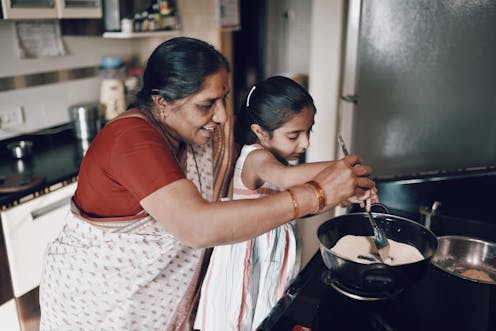
The Research Brief is a short take about interesting academic work.
The big idea
The death of a grandmother can have severe and lasting mental health consequences for both her adult children and grandchildren, according to our recently published study.
This finding may be surprising, because the death of a grandparent is a normal, even anticipated, part of life. Yet the effects are profound. Losing a grandparent can increase adolescents’ risk of having a depressed parent and of having higher depressive symptoms themselves.
Decades of research show that grandparents’ involvement and support is beneficial to their grandchildren. This is especially true for kids growing up with single mothers. Maternal grandparents often act as a safety net, providing benefits like housing stability, child care and financial and emotional support, all of which benefit their grandchildren’s health and development.
But what happens when a grandparent dies? In our study, we used a national dataset on a sample of mother and adolescent pairs whom researchers have interviewed multiple times since the child’s birth. We analyzed whether a maternal grandparent’s death during later childhood or early adolescence affected adolescents’, or their mothers’, depressive symptoms, net of depressive symptoms before the loss.
Following a grandmother’s death, adult daughters were more likely to become depressed relative to other women. Adult daughters experienced this increase in depression for up to seven years following the death. Adolescent boys who lost their grandmother in the prior seven years also had higher depressive symptoms than their peers. We found no statistically significant increase in depression following a grandfather’s death.
Why it matters
Adolescent mental health has worsened in recent decades. Experts stress the potential for the COVID-19 pandemic to accelerate this concerning trend, pointing to the financial hardships, school disruptions and social isolation as prime reasons young people’s mental health could decline further.
The mental health effects of losing a loved one to COVID-19 have been curiously overlooked. Although young people experience low COVID-19 mortality rates, COVID-19 mortality has intimately affected millions of young people. Tens if not hundreds of thousands of youths in the U.S. have lost parents to COVID-19. And as of June 2022, our statistical models suggest that approximately 4 million people in the U.S. have lost a grandparent to COVID-19 in a mere two years – representing a significant increase in the burden of grandparental death experienced prior to the pandemic.
Our study suggests that this dramatic increase in the number of grieving adolescents will increase rates of depression in the U.S.
What still isn’t known
A troubling possibility is that having a grandparent die of COVID-19 is even harder for adolescents than the pre-pandemic losses that we studied. COVID-19 deaths epitomize “bad deaths” – painful, frequently sudden deaths that happen alone and often strip families of the chance to say goodbye.
In other recent research, we found that adults who lost a spouse to COVID-19 face higher rates of depression and loneliness than those whose spouse died right before the pandemic. Future research can assess whether losing a grandparent to COVID-19 has more severe or far-reaching consequences for adolescents than our analysis of pre-pandemic data shows.
We are also still examining the gendered nature of our study’s findings. Why does the loss of a grandmother seem to have deeper and longer-lasting effects than that of a grandfather? Why are boys uniquely vulnerable after losing a grandmother?
Gender socialization could explain boys’ higher depressive symptoms after a grandmother’s death. Adolescent boys may feel pressure to internalize their emotions. Additionally, a grandfather’s death could affect adolescents in other ways, such as their school performance and grades, maintenance of healthy relationships or risk behaviors.
Even as this study offers a small window into the distress of losing a grandparent, our findings underline the pressing need for adolescents and their parents to have access to support services as they navigate the cascading consequences that such a loss can set in motion – an all-too-common experience in the COVID-19 era.
Emily Smith-Greenaway receives funding from the National Science Foundation and the National Institute of Child Health and Human Development. She is a member of the Evermore Foundation's scientific advisory board.
Ashton Verdery receives funding from the National Institute on Aging, which is a part of the National Institutes of Health. He is affiliated with Evermore Foundation as a member of its scientific advisory board.
Rachel Margolis receives funding from the Social Sciences and Humanities Research Council of Canada.
Michelle Livings does not work for, consult, own shares in or receive funding from any company or organization that would benefit from this article, and has disclosed no relevant affiliations beyond their academic appointment.
This article was originally published on The Conversation. Read the original article.







